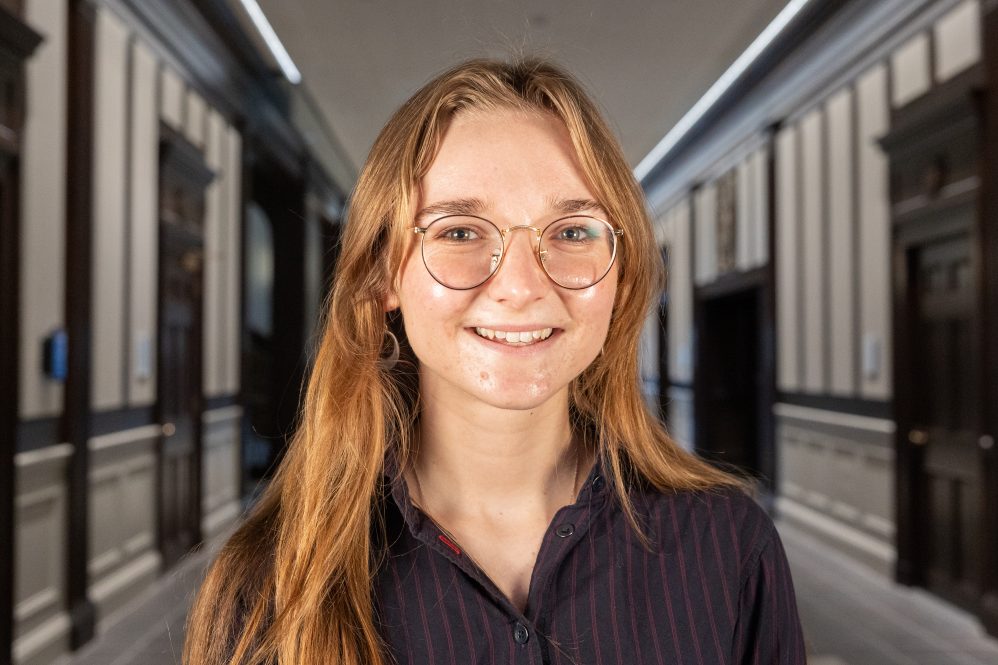Initially, Lili Kane felt a little overwhelmed when she first arrived on campus. However, she was quickly drawn in by the wide array of degree programs, extracurricular activities, and the supportive guidance of her professors. Her interest in exploring different topics led her to pursue dual degrees in Anthropology and Ecology and Evolutionary Biology, where she was excited to find that solutions to major questions in these fields often overlap. After taking a well-deserved break, Lili plans to continue her studies this summer and work with natural history and anthropology collections.
Why did you choose UConn?
I’m from Connecticut and live near a regional campus, so it has always been on my radar as a great school. Since I didn’t know what I wanted to study going in, I was drawn to the wide range of majors and extracurricular opportunities UConn offers.
What’s your major or field of study, and what drew you to it?
I am in the dual degree program, majoring in Anthropology and Ecology & Evolutionary Biology, with a minor in Spanish. I’ve always loved spending time outdoors, so the EEB courses immediately drew me in. Anthropology was a fun surprise inspired by a freshman gen-ed class. To me, both Anthropology (especially archaeology) and Evolutionary Science are big puzzles with lots of missing pieces. Thinking through different solutions to these puzzles is what makes me excited to keep studying. Throughout my time, I’ve found that there’s considerable overlap between my majors and I really love getting to learn a wide range of topics.
Did you have a favorite professor or class?
It’s hard to choose! The ones that stand out in my memory the most are Global Change Ecology, Race and Human Biodiversity, and Paleoanthropology – basically all the classes that combined both my majors! A big shoutout to David Wagner and Christian Tryon, who are both excellent professors and great people.
What activities were you involved in as a student?
I’ve worked with the Connecticut State Museum of Natural History on behind-the-scenes collections research and processing. With them, I was a part of a Skinning Club that taught us how to prepare specimens for their research collections. I also worked in a soil science lab, with Dr. Maltz, studying mycology and soil interactions, particularly in the bioremediation of disturbed habitats. Working on research that has a real impact improving both our habitats and people’s lives has been amazing.
What’s one thing that surprised you about UConn?
Despite its size, the professors at UConn, in my experience, have always been extremely generous with individualized help and advice. I have had some amazing professors that fundamentally changed the way I view the world. When I entered UConn, I felt a bit like a little fish in an endless ocean, but I’ve learned that opportunities are plentiful if you work hard and ask nicely.
What are your plans after graduation/receiving your degree?
First on my after-graduation agenda is a long nap. After that, over the summer, I am planning to do more museum work with natural history or anthropological collections. I also will try to get some experience doing archaeology, since I’ve only recently realized how fascinating I find it! A bit further ahead, I’m hoping to go to graduate school, though I’m not sure yet what program.
What’s one thing everyone should do during their time at UConn?
Explore the nature around us! I’ve found my most serene moments wandering through the UConn Forest or sitting under a tree by Mirror Lake. There’s a lot of cool hikes nearby that can make the repetition of daily classes just disappear.
What will always make you think of UConn?
The smell of cows on a hot day…



